|
.jpg)
O.V. Delle-Femine (circa 1964)
|
In the Beginning
O.V. Delle-Femine (pronounced Dell-Fem-a-knee), commonly referred to as "Dell," spent a stint as an Air Force mechanic during the 1950s, and then was hired by American Airlines and stationed at LaGuardia Airport in New York. Naturally gregarious and inclined toward politics, Dell began attending union meetings. The Transport Workers Union (TWU) represented American’s mechanics -- a broad-based union that represented more bus drivers and subway workers than aircraft mechanics. In 1968 Dell left American Airlines to devote his time to building a union that solely represented Aircraft Maintenance Technicians, and thus AMFA’s journey began.
In 1961, Dell and two friends from American Airlines, John Manchester and Dave Herr, became increasingly distraught over the representation of the TWU. “Mechanics were a minority, and we didn’t have the numbers to get a good contract,” Dell recalled. “We’d go to meetings and there would be other crafts there that had nothing to do with us. They wouldn’t even listen to us… I’m not saying we’re elitist; doctors and lawyers are elitist. But mechanics have been shortchanged.” And with this motivation the three founders set out to start their own union. In November 1961, along with 40 Associate Members, they held the first AMFA National Convention in Des Plaines, Illinois where they named this new organization the Aircraft Mechanics Fraternal Association (AMFA). At this National Convention, they wrote and adopted the AMFA National Constitution and elected O.V. Delle-Femine as the first AMFA National Director. The first AMFA local chartered was Local 2 (Boston, Massachusetts) in 1963.
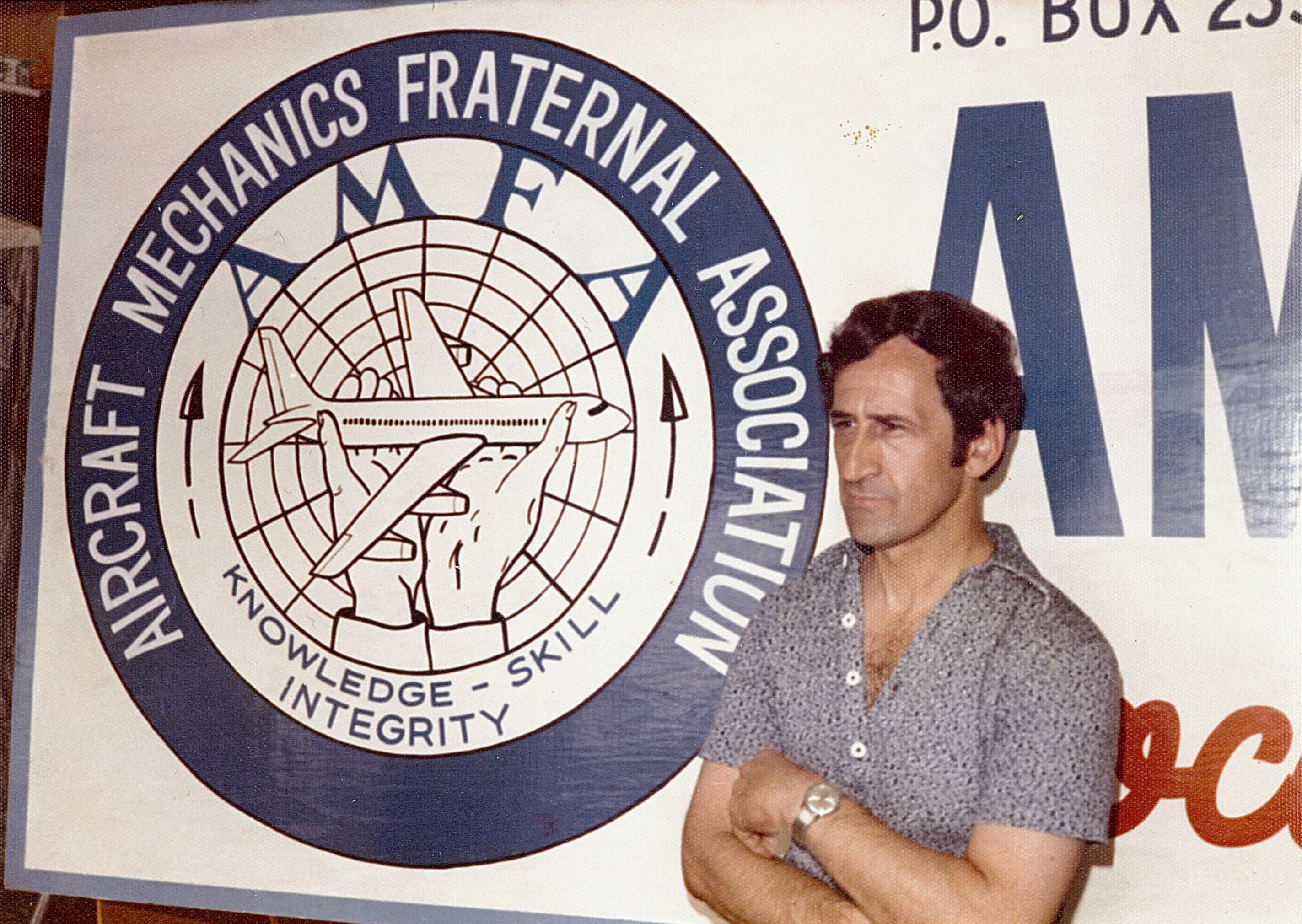
Dell (circa 1974) |
A showdown occurred one day in the mid-1960s in St. Louis. Two courting unions and Dell (representing AMFA) spoke to mechanics from Ozark Air Lines, who would soon be choosing a union. The other unions tried to limit Dell’s time at the microphone, but the more they tried to stifle him, the hotter the audience grew. AMFA had its first successful union representational election in 1964 at Ozark Airlines, where it would serve the Aircraft Maintenance Technicians for the next 20 years.
AMFA’s organizing activities were not welcomed either by the companies or the unions that already possessed Aircraft Maintenance Technician members. “In the 1960s, during a meeting with American Airlines in Tulsa, the incumbent representatives arrived with chains and baseball bats,” Dell recalled. “There was a case of empty Coke bottles nearby. I was ready to throw them if I had to.” He recounted anonymous calls to his wife: “they told her I was out with another woman. Even women called my house. Fortunately, I had a strong Irish wife who was very tough.”
Martin Seham, a New York lawyer, had helped American Airlines’ pilots establish their own independent union. With knowledge regarding Seham’s success with the pilots, Dell and three others (dressed in their work cloths) visited Seham in his midtown Manhattan office to discuss work with AMFA. Martin Seham became AMFA’s attorney in the 1960s. “They were deferential, they were respectful, and they were absolutely unmovable in terms of the principles they were pursuing,” Seham recalls. “They were in trouble financially and yet at the same time they were getting more and more members.”
Seham says their passion awakened his own dream of helping the working class. The lawyer agreed to represent AMFA and let the union pay him when it could. He would represent AMFA for more than 20 years; his son, Lee Seham, who is widely respected amongst the membership and leadership, still represents AMFA today.
Effects of the Airline Industry in the Wake of Deregulation
AMFA soon was winning elections at other airlines beyond Ozark, including Braniff, Hughes Air West, and the Trump Shuttle. The Association was obtaining members raises, better pensions, and pay premiums for special skills. But, further success proved elusive.
As smaller airlines merged into bigger ones, the government would hold an election for workers to choose between competing unions (single carrier status election). Since a much bigger airline was always buying the carrier that AMFA represented, the new bigger airline’s union would win those elections. One by one, AMFA lost the smaller airlines it had represented. AMFA had represented mechanics at Southern Airways and Hughes Air west, which merged with North Central to later become Republic Airlines by the early 1980s. Although larger unions ended up representing mechanics at Republic, AMFA-inspired provisions in their contract remained until the Northwest-Republic merger in 1986.
In 1986, Trans World Airlines gobbled up Ozark, and for the next several years, Dell was a union leader representing only Associate Members (the backbone of AMFA) who kept the Association alive.
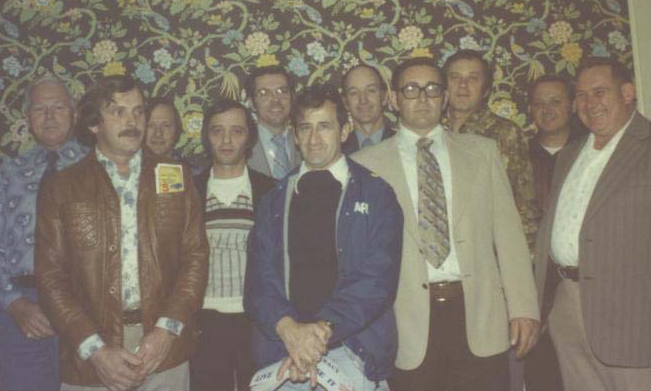 Dell & members at an event (circa 1970s) Dell & members at an event (circa 1970s) |
Tough Times
The stories of how Dell sacrificed to build the union, from sleeping in airport terminals on organizing trips when he had no money for a room to living out of a suitcase for over a decade, has won converts at airline after airline. During the two years of Northwest Airlines contract negotiations (and the preceding organizing drive), he lived out of a budget motel near the Minneapolis-St. Paul Airport.
Dell was a pillar of strength to all of the Aircraft Maintenance Technicians in the airline industry. It is believed that few people, if any, would be able to go through what Dell had endured personally and professionally, and rebounded time and time again. The adjective “tenacious” best describes his character in over 45 years of focus towards AMFA’s philosophies.
The Associate Membership spanning across the United States supported Dell and AMFA in keeping its beliefs alive. Contemplating at one point to concede, Dell’s wife Marie is credited with refusing to allow him to give up.
The stories of how Dell sacrificed to build the union, from sleeping in airport terminals on organizing trips when he had no money for a room to living out of a suitcase for over a decade, has won converts at airline after airline. During the two years of Northwest Airlines contract negotiations (and the preceding organizing drive), he lived out of a budget motel near the Minneapolis-St. Paul Airport.
Dell was a pillar of strength to all of the Aircraft Maintenance Technicians in the airline industry. It is believed that few people, if any, would be able to go through what Dell had endured personally and professionally, and rebounded time and time again. The adjective “tenacious” best describes his character in over 45 years of focus towards AMFA’s philosophies.
The Associate Membership spanning across the United States supported Dell and AMFA in keeping its beliefs alive. Contemplating at one point to concede, Dell’s wife Marie is credited with refusing to allow him to give up.
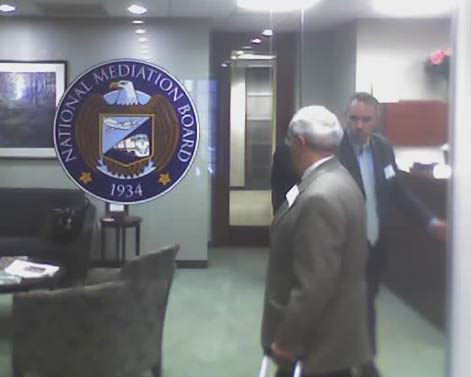
Dell & Lee Seham at the National Mediation
Board in Washington, DC (circa 2000) |
The Tide Turns
Things began to turn for AMFA in the 1990s. AMFA was expanding at an increasing rate and was in need of professional administrative support. In 1995 AMFA enlisted the services of the McCormick Advisory Group (MAG) in Laconia, NH to fulfill the administrative aspects of the Association. MAG assisted in all areas of administration from financial services, officer elections, organizing, facilitating the AMFA National Conventions, assisting the NEC, and economic advising during airline contract negotiations.
After a year of deliberations, in 1998 the National Mediation Board in Washington, D.C. ruled that the aircraft mechanics
and related could finally be represented solely by the classification of the “Mechanics Class and Craft.” This ruling made it harder for industrial unions to “inflate” the voting populace with members represented in other classifications; thereby, nullifying AMFA’s representational efforts in organizing their own class of Aircraft Maintenance Technician and Related.
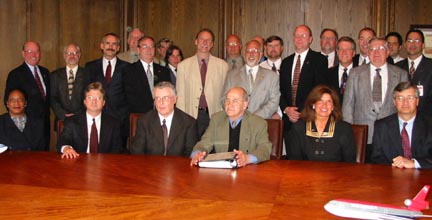
AMFA-NWA Negotiating Committee, and NWA Executives signing industry leading AMT contract (May 2001) |
AMFA won the right to represent the mechanic & related class at Mesaba, the regional carrier that operates as Northwest Airlink from Detroit and Minneapolis-St. Paul in 1996. Another victory followed at Alaska Airlines in 1998. AMFA was certified as the representational agent for 10,000 mechanics and aircraft cleaners at Northwest in 1999. An industry leading contract was achieved by the members at Northwest on May 9th of 2001. Southwest was won a year later in 2002 in three months. Horizon Air also joined AMFA in 2002. United Airlines was added in July 2003. AMFA, “The little union that could” now represented three of the top five, and half of the top ten major Airlines in the United States.
In August of 2006, AMFA National took over responsibility of the administrative functions and moved the National Office to Aurora, Colorado.
After almost a half-century of guiding AMFA, Dell retired in 2008. In 2015, Dell passed away after a lengthy illness. His efforts and sacrifices for the Aircraft Maintenance Technician and Related are legendary and cement a legacy that continues on today through the elected officials at AMFA.
|
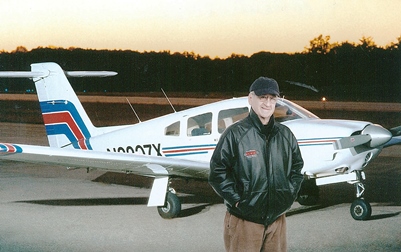
Dell (2008)
|
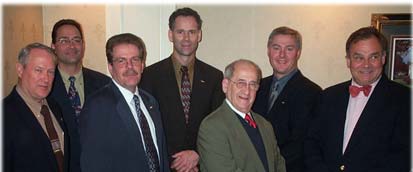 AMFA National Executive Council in 2004 (from left to right) Back row: Kevin Wildermuth, Region III Director; Jim Young, Region II Director; Louie Key, Region I Director. Front row: Ken Wagers, National Treasurer; Steve Lanier, National Secretary; O.V. Delle-Femine, Founder and National Director; and Frank Boksanske, National Safety & Standards Director. AMFA National Executive Council in 2004 (from left to right) Back row: Kevin Wildermuth, Region III Director; Jim Young, Region II Director; Louie Key, Region I Director. Front row: Ken Wagers, National Treasurer; Steve Lanier, National Secretary; O.V. Delle-Femine, Founder and National Director; and Frank Boksanske, National Safety & Standards Director. |
The More Things Change, the More They Stay the Same
Although the airline industry and its unions have faced recent struggles due to the trend towards consolidation, AMFA's members enjoy quality representation from a craft-specific union dedicated to their profession. AMFA’s Constitution is one of the most, if not the most, democratic in the airline industry today. We honor those countless and nameless volunteers who have personally sacrificed for the Association because they deeply believe in the following AMFA philosophies: accountability, officer recall ability, democracy, professionalism, integrity, knowledge, and skill.
The Future is Bright
Today, AMFA is proud to represent Aircraft Maintenance Technicians and Related at Alaska Airlines, Horizon Air, and Southwest Airlines. Our members enjoy industry-leading pay and benefits as well as programs unique to AMFA, such as the Accident Investigation Team, Professional Standards, and numerous other craft-based goals and initiatives. The leadership at AMFA is steadily guiding the Association into the future while remaining aware of the past and never forgetting that together we are strong.
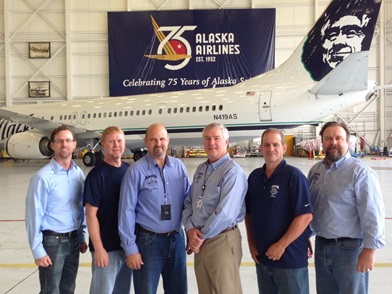
AMFA NEC in 2013 (from left to right) Justin Madden, National Secretary/Treasurer; Mike Nelson, Region II Director; Earl Clark, Region I Director; Louie Key, National Director; Aaron Hansen, Assistant National Director; David Brooks, National Safety & Standards Director.
|
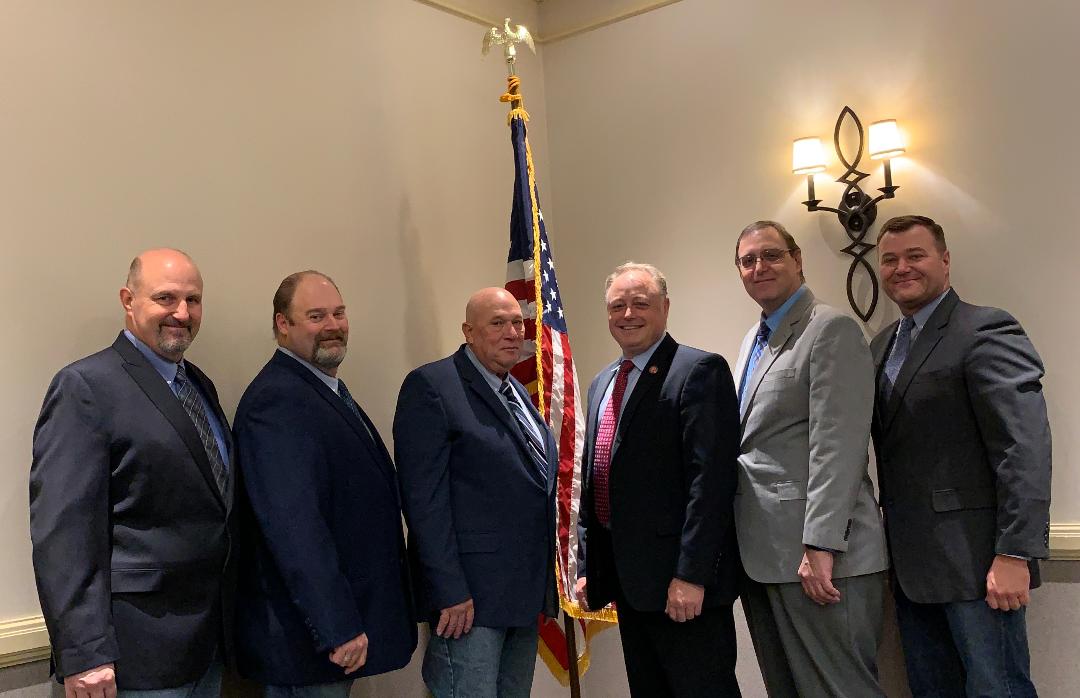
AMFA NEC in 2020 (from left to right): Earl Clark, Region I Director;
Scott King, National Safety & Standards; Gene Painter, Assistant National Director; Bret Oestreich, National Director; Jay Johnson, National Secretary/Treasurer; Will Abbott, Region II Director |
AMFA In Canada
On October 18, 2022, the Canadian Industrial Relation Board (CIRB) officially certified the Aircraft Mechanics Fraternal Association (AMFA) as the collective bargaining agent at L3 Harris MAS as CFB Trenton (L3), marking AMFA's first group in Canada. Momentum in Canada quickly picked up and AMFA was certified at WestJet in March 2023.
There are more than 100 Aerospace and Defense Contractors and approximately 550 licensed air carriers transporting passengers and cargo to destinations both domestic and international in Canada. There are approximately 17,000 AMEs in Canada that require a union to advocate for trade-specific values and interests.
The Aircraft Maintenance Engineers (AMEs) and skilled trade groups deserve distinction in their trade and justifiable respect. In a unified approach, we must seek focused bargaining and consistent application of fair work rules in efforts to address and restore the deteriorated culture of the workplace. These Aircraft Maintenance Operations need to recognize the relevance of these highly skilled trade professionals to the success of their operation, as well as to secure public trust. In the interest of public safety, AMFA strives for the highest standards in aircraft maintenance not only in Canada but across North America.
AMFA looks forward to helping to improve and stabilize the aviation industry by assisting, promoting, advising, and giving support to Canadian organizations and continuing operations and activities of other Canadian labor organizations whose objectives are consistent with those of AMFA.
|
